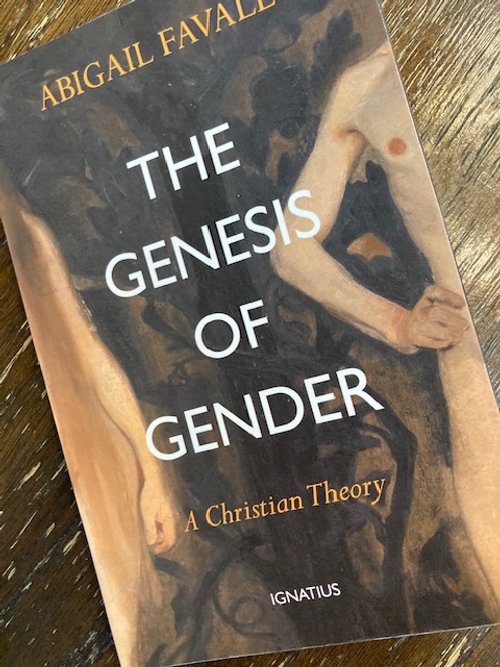I'm readin' a book...
Each body is an icon of Christ; each body is a sacrament; revealing to us the sacred and unrepeatable mystery of the person.
Let our knees tremble in wonder at this.
Bodies are not “just” bodies. Bodies are persons made manifest.
Abigail Favale
Gender.
What is gender?
How can we speak about it in our culture today?
Wouldn’t we all love a couple sentences as a ‘go to’?
I believe the above quote is truth, but in our culture that truth takes some practice to articulate well. It can seem like a field of landmines to navigate around.
I believe it’s worth spending some time and brain power thinking through this how to articulate a doctrine of gender in common words understood by teenagers.
‘Why is it worth it?’, you might ask?
We are called to love, with truth and grace, the person in front of us. Loving someone who is standing in front of us takes effort- especially to ba;lance the grace and truth in faithful ways.. Therefore, we must expend effort. To me it doesn’t seem optional.
Standing in front of us today in our culture are growing numbers of teens, pre-teens, and young adults who have deep and significant questions surrounding gender.
These questions impact their view of themselves, their view of God, their view of marriage (the metaphor God uses throughout scripture to explain how He loves us), and their view of Christians.
There are tons of topics that seem optional for me to be conversant in- auto repair, roofing, neuro surgery, politics, the Travis Kelsey “push” during the Superbowl.
But topics that potentially have a huge impact as I speak to someone seem worth paying the ‘brain bill’ (Dave Ramsey) in order to choose words my carefully.
This month, I want to encourage you to read The Genesis of Gender by Abigail Favale. Abigail Favale, Ph.D., is a writer and professor in the McGrath Institute for Church Life at the University of Notre Dame. She has an academic background in gender studies and feminist literary criticism, and now writes and teaches on topics related to women and gender from a Catholic perspective. She’s written a book that helps provide historical context for the current gender paradigm in our culture.
I’ve been working slowly through this book as it’s deep and thought provoking. It’s challenged me to really be fluent in how and why the scriptures frame gender the way that they do.
Her conversion to Catholicism immerses her in a rich history of thinkers.
I did not grow up with any faith background, and once I received Jesus’ offer of salvation, I became an evangelical- though I had no idea for about a decade what that even meant.
Through my journey in the last couple decades learning and loving doctrine related to singleness, gender and sexuality, I have come to have a deep, deep appreciation for the thinking done in this area by our Fathers in the faith.
Dr. Favale walks through the history of thought related to gender and how we’ve arrived at some of the societal conclusions prevalent today.
Since I want to encourage you to read this book yourself, I’m going to sprinkle (play on words intended to remind to of our last book review by Preston Sprinkle, Does the Bible Support Same Sex Marriage? in a couple quotes:
Remember in the gospels when Jesus is questioned by the Pharisees about divorce? Dr. Favale writes:
Christ’s Incarnation, His coming into the world, ushers in a new order, the order of grace and redemption, that seeks to restore what has been broken by sin…He turns our eyes back towards Genesis and urges us, with divine help, to reclaim the goodness of the created order, the gift of our bodies and the earth, and to cultivate anew a dynamic of reciprocity between the sexes… In this order, sexual difference is understood and experienced as a gift, a source of fruitfulness and love.
She explains that sin corrupted this relationship bringing domination and distortion.
Feminism (she writes) rightly recognizes that something is amiss, that the relationship between men and women has too often been characterised by domination.
But feminist theory falls short because it doesn’t understand grace and operates from a different foundation of beliefs about reality and truth.
She goes on to discuss the consequences of the widespread use of contraceptives.
From the 1960’s onward, feminists have followed in the footsteps of Sanger and de Beauvoir, locating women’s oppression in their biology and advocating for a version of “health” that pathologizes female fertility.
We now think of sex as a recreational, rather than procreational, activity. The connection between sex and the possibility of new life have been severed…Pregnancy is often seen as a sexual mishap, a case of sex-gone-wrong, rather than the very outcome that sexual intercourse is designed to bring about.
The unmooring of sex from life has cheapened it and cheapened us, fueling a consumeristic sexual paradigm that trumpets liberation while enslaving us.
I really could go on and on with sentences and paragraphs that have taught and challenged me.
Please pick this book up and plan on a slow read.
As always- I’d love to discuss as you read! Hit me up for coffee in person or via zoom!
